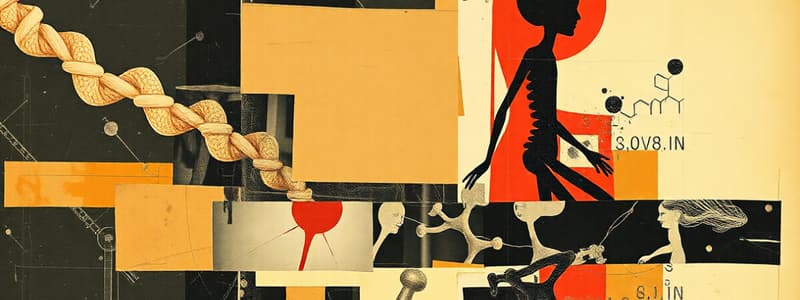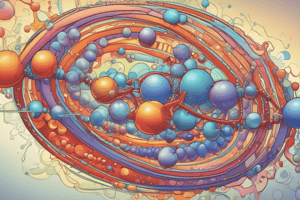Podcast
Questions and Answers
What is the normal blood glucose level according to the provided text?
What is the normal blood glucose level according to the provided text?
160
What is the normal blood glucose level according to the World Health Organization (WHO)?
What is the normal blood glucose level according to the World Health Organization (WHO)?
140
What is the primary function of the enzyme glukokinaz?
What is the primary function of the enzyme glukokinaz?
It converts Glucose to Glucose-6-Phosphate
Which of the following is a function of anti-oxidant enzymes?
Which of the following is a function of anti-oxidant enzymes?
The enzyme hexokinase is specific only to glucose.
The enzyme hexokinase is specific only to glucose.
What substance is a precursor to the formation of squalen, A Vitamin, and lycopene?
What substance is a precursor to the formation of squalen, A Vitamin, and lycopene?
What is the name of the substance that lowers cholesterol levels?
What is the name of the substance that lowers cholesterol levels?
What is the name of the substance that is responsible for the color of tomatoes?
What is the name of the substance that is responsible for the color of tomatoes?
What is the process called when a molecule loses an electron?
What is the process called when a molecule loses an electron?
What is the name of the molecule that stores glucose in the liver and muscle cells?
What is the name of the molecule that stores glucose in the liver and muscle cells?
The process of Glycogenolysis is the breakdown of glycogen into glucose.
The process of Glycogenolysis is the breakdown of glycogen into glucose.
What is the main function of the enzyme phosphotase?
What is the main function of the enzyme phosphotase?
What is the name of the molecule that is formed when ATP loses one phosphate group?
What is the name of the molecule that is formed when ATP loses one phosphate group?
The enzyme phosphorylase a is active by itself, without the need for any additional factors.
The enzyme phosphorylase a is active by itself, without the need for any additional factors.
What is the function of the enzyme phosphorylase b?
What is the function of the enzyme phosphorylase b?
Which hormone stimulates the release of glycogen from the liver?
Which hormone stimulates the release of glycogen from the liver?
The rate of branching in glycogen molecules is 1:10, meaning there is one branch point for every 10 glucose molecules.
The rate of branching in glycogen molecules is 1:10, meaning there is one branch point for every 10 glucose molecules.
The process of glycogenesis refers to the breakdown of glycogen into glucose.
The process of glycogenesis refers to the breakdown of glycogen into glucose.
The presence of oxygen promotes the conversion of pyruvate to lactate.
The presence of oxygen promotes the conversion of pyruvate to lactate.
The hormone insulin has a direct effect on the uptake of glucose into fat cells.
The hormone insulin has a direct effect on the uptake of glucose into fat cells.
What is the name of the glucose transporter found in muscle and fat cells?
What is the name of the glucose transporter found in muscle and fat cells?
Which hormone enhances the production of glucose from non-carbohydrate sources?
Which hormone enhances the production of glucose from non-carbohydrate sources?
What is the term for the process by which glucose is converted into glycogen?
What is the term for the process by which glucose is converted into glycogen?
Insulin is considered an antagonist to growth hormone, while growth hormone promotes gluconeogenesis.
Insulin is considered an antagonist to growth hormone, while growth hormone promotes gluconeogenesis.
The thyroid hormone can have a stimulatory effect on glucose metabolism, increasing the rate of gluconeogenesis.
The thyroid hormone can have a stimulatory effect on glucose metabolism, increasing the rate of gluconeogenesis.
What is the name of the substance that is involved in the breakdown of bilirubin?
What is the name of the substance that is involved in the breakdown of bilirubin?
The absence of oxygen in the environment promotes the formation of bilirubin.
The absence of oxygen in the environment promotes the formation of bilirubin.
The Pasteur Effect is a phenomenon that describes the increase in glucose consumption in the presence of oxygen.
The Pasteur Effect is a phenomenon that describes the increase in glucose consumption in the presence of oxygen.
In the process of glycolysis, which molecule converts pyruvate to lactate?
In the process of glycolysis, which molecule converts pyruvate to lactate?
The enzyme hexokinase is specific to glucose, whereas glukokinaz can act on a wider range of hexose sugars.
The enzyme hexokinase is specific to glucose, whereas glukokinaz can act on a wider range of hexose sugars.
The breaking down of glycogen into glucose is referred to as glycogenesis, while the building up of glucose into glycogen is called glycogenolysis.
The breaking down of glycogen into glucose is referred to as glycogenesis, while the building up of glucose into glycogen is called glycogenolysis.
What type of molecule is considered the main component of the cell membrane, which is involved in the formation and transport of steroid hormones?
What type of molecule is considered the main component of the cell membrane, which is involved in the formation and transport of steroid hormones?
Squalen is the precursor molecule for the formation of cholesterol.
Squalen is the precursor molecule for the formation of cholesterol.
The substance lovastatin is known to increase cholesterol levels in the body.
The substance lovastatin is known to increase cholesterol levels in the body.
What is the main type of fatty acid found in the structure of triglycerides?
What is the main type of fatty acid found in the structure of triglycerides?
A deficiency in vitamin A can lead to a condition known as night blindness.
A deficiency in vitamin A can lead to a condition known as night blindness.
The red color of tomatoes is due to the presence of a pigment called lycopene, which also has antioxidant properties.
The red color of tomatoes is due to the presence of a pigment called lycopene, which also has antioxidant properties.
Flashcards
Hemoglobin
Hemoglobin
A protein in blood that carries oxygen.
Iron (Fe)
Iron (Fe)
Component of hemoglobin's heme part.
Spleen
Spleen
Organ that filters blood and removes old red blood cells.
Bilirubin
Bilirubin
Signup and view all the flashcards
Albumin
Albumin
Signup and view all the flashcards
Hepatocyte
Hepatocyte
Signup and view all the flashcards
Portal vein
Portal vein
Signup and view all the flashcards
Bilirubin diglucuronide
Bilirubin diglucuronide
Signup and view all the flashcards
Kidney
Kidney
Signup and view all the flashcards
Enterohepatic circulation
Enterohepatic circulation
Signup and view all the flashcards
Glukoneogenesis
Glukoneogenesis
Signup and view all the flashcards
Von Gierke disease
Von Gierke disease
Signup and view all the flashcards
Hypoglycemia
Hypoglycemia
Signup and view all the flashcards
GLUT4
GLUT4
Signup and view all the flashcards
Insulin
Insulin
Signup and view all the flashcards
cAMP
cAMP
Signup and view all the flashcards
2,3-DPG
2,3-DPG
Signup and view all the flashcards
Growth Hormone (STH)
Growth Hormone (STH)
Signup and view all the flashcards
Adrenocorticotropic Hormone (ACTH)
Adrenocorticotropic Hormone (ACTH)
Signup and view all the flashcards
Glucagon
Glucagon
Signup and view all the flashcards
Epinephrine
Epinephrine
Signup and view all the flashcards
Glycogen Phosphorylase
Glycogen Phosphorylase
Signup and view all the flashcards
Glycogen
Glycogen
Signup and view all the flashcards
Koenzim Q
Koenzim Q
Signup and view all the flashcards
Study Notes
Biochemistry Study Notes
- Biochemistry is a complex subject that involves complex processes.
- Glucose is used by the body.
- Normal glucose level is 160.
- World Health Organization (WHO) recommends 140.
- Glycogen synthesis is a significant metabolic pathway.
- Glycolysis, the breakdown of glucose, involves enzymatic reactions.
- Glycogen synthesis involves enzymes such as glucokinase, phosphoglucoisomerase, phosphoglucomutase, UDPG pyrophosphorylase, glycogen synthase.
- Glycogenolysis is the process of breaking down glycogen for energy.
- Gluconeogenesis is the process of producing glucose from non-carbohydrate sources.
- Glycogen stores branches every 6-11 glucose molecules.
- CAMP is involved in enzyme activation.
- ATP is used in the process.
- Phosphorylase b is activated by 5 AMP.
- This leads to glycogen breakdown.
- Oxygen saturation needs to be observed in patients.
- Hormones like glucagon and epinephrine affect glucose metabolism.
- Different enzymes involved in glucose metabolism and regulation are discussed.
- Liver plays a critical role in glucose regulation.
- Insulin and glucagon regulate blood glucose levels.
- Different components of glucose metabolism are explained and their functions are outlined.
- Glucose is essential for energy production.
- Metabolism is a complex network of biochemical reactions.
- There are various metabolic pathways, such as glycolysis, glycogenolysis, gluconeogenesis, and the citric acid cycle.
- Enzymes are crucial catalysts in these pathways.
- Different hormones including epinephrine and glucagon are involved in regulating glucose.
- Blood glucose levels are maintained within a specific range.
- Different types of molecules such as lipids, proteins, and carbohydrates are essential for various body functions.
- The metabolism of these molecules is interconnected with glucose metabolism.
Glucose Metabolic Control
- Regulation of glucose is critical for the body's function.
- Hormones like glucagon and epinephrine play key roles in blood glucose levels.
- Conditions like Von Gierke's disease affect glucose metabolism and regulation.
- Glucose homeostasis involves various organs, including the liver, intestines, kidneys, and muscles.
- The liver stores glucose as glycogen and releases it as needed.
- Insulin directly affects glucose uptake by cells.
- Glucose transporters GLUTS play critical roles.
- Hormones ACTH and STH act as antagonists to insulin.
- Excessive secretion of adrenalin can be a result of hypoglycemia.
- Some hormones like thyroid and glucagon increase glucose production.
- The different amounts of glucose eaten daily is also important to observe.
- Monitoring of glucose levels is important.
- Blood glucose ranges between 70-110 mg/dL.
- High glucose levels (hyperglycemia) are associated with conditions like diabetes.
- Certain factors can affect the rate of glucose intake.
- The rate and route of glucose uptake varies in different tissues.
Components of Biochemistry
- Lipids, proteins, and carbohydrates are essential components.
- Different types of lipids are crucial to different parts of the body.
- Proteins have diverse roles such as enzymes and structural support.
- Structural elements and cellular functions are important when looking at lipids and proteins.
- Molecules like cholesterol, vitamin A etc come from different sources.
- Hormones have a large effect on all these components.
- Different types of molecules such as lipids, proteins, and carbohydrates have specific metabolic pathways.
- The structures and functions of many small molecules are critically important.
- Complex molecules like proteins are crucial for cell function.
- Different molecules are essential building blocks for larger structures, both in the cell and throughout the body.
Studying That Suits You
Use AI to generate personalized quizzes and flashcards to suit your learning preferences.




